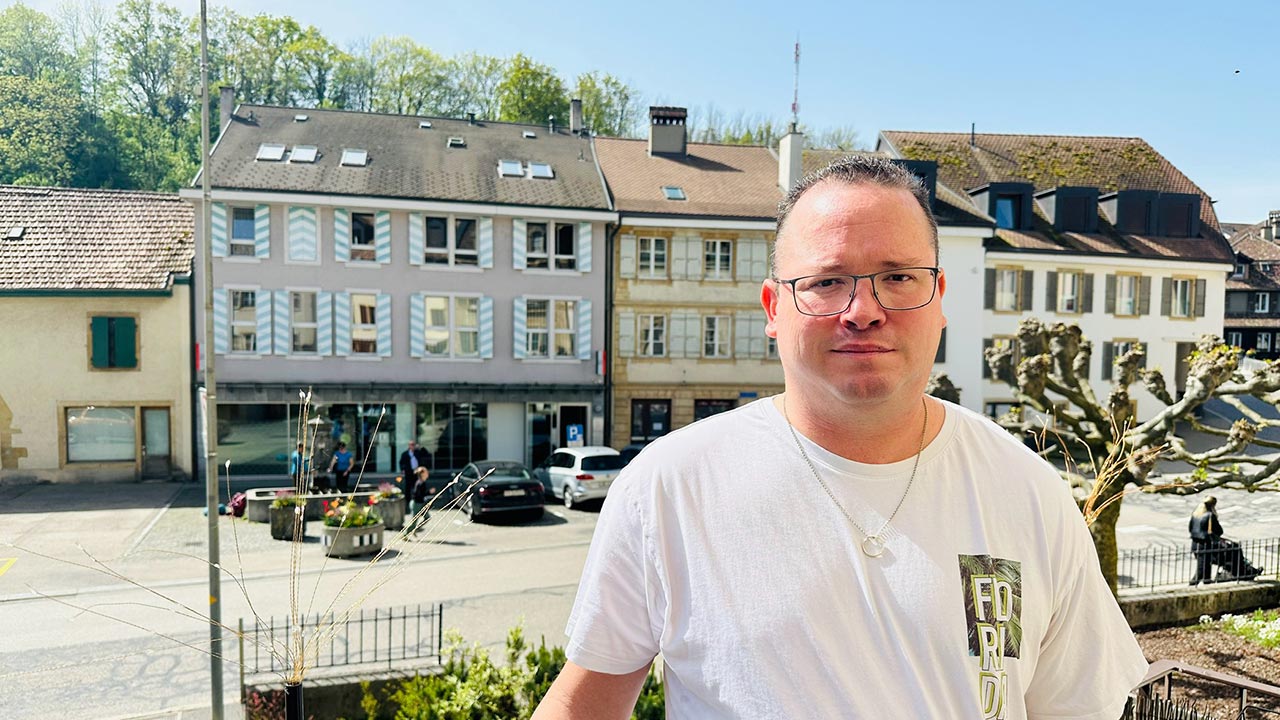
HIV and mental health – Team
After Stéphane developed AIDS, he was on the brink of death. Mental self-care is more important to him now than ever.
A truck driver by profession, a passionate fisherman, a volunteer firefighter and married to a woman, Stéphane was in the prime of his life when he lost the muscle strength in his left arm and hand and was admitted to hospital. They kept him there for a few days, then for several weeks. He became extremely tired and the simplest movements suddenly became painful: standing up, walking, climbing stairs. “The numbness started in my foot, then in my hand and finally moved to my face,” says Stéphane. “Every time I woke up in the morning, I had lost more mobility and parts of my body had stopped working. My brain lost control of the left side of my body.”
When his doctor diagnosed him with HIV, AIDS had already broken out. “He told me that I was as good as dead. My T-helper cell count was 169,” Stéphane says today. The normal value for the number of helper cells varies from person to person and is usually between 500 and 1500 cells per microliter of blood.1 If the value is less than 200, the AIDS stage is considered to have been reached.2 His doctor immediately started antiretroviral therapy. “He didn’t think I would make it. But I did.” The inflammation in the brain was caused by the JC virus, which is latent in the body of a large part of the population and was reactivated when Stéphane’s immune system was weakened by HIV.
A coming out in the darkest times
The inflammation progressed and within three weeks Stéphane was paralyzed on the entire left side of his body. This was followed by five months in a wheelchair, two hospital admissions and a stay in a nursing home – an odyssey lasting almost two and a half years. It was a dark time for Stéphane. He needed help to get up, shower and go to the toilet. “I had hit rock bottom. I thought there was no point in hiding anymore. Now everything has to be on the table,” he says. Stéphane had a double coming out: on the one hand as a gay man, and on the other as a man living with HIV.
As a result, some friends and acquaintances turned away from him. He fell into a depression and tried to end his life several times. “I am aware that my story is not a very exemplary one, after all I was still married to my wife,” says Stéphane. “I was very lucky that my family and some very close friends supported me. Above all, my parents and my sister were by my side every day.”
Stéphane remembers a nurse who looked after him at the time. “He calmed me down and told me not to worry,” he says. “I didn’t understand it at the time, but it was his way of telling me that he was also living with HIV. And that everything would be OK.”
“It’s my lack of mobility that bothers me, not living with HIV”
Living with HIV is not a burden for Stéphane
That was in 2016. Today, Stéphane is divorced and lives independently in an apartment near Neuchâtel. The left side of his body is partially paralyzed and he receives a full disability pension. He can walk again, but his mobility is severely limited. “It’s my lack of mobility that bothers me, not living with HIV,” he says. “When I learned what it meant to have a viral load below the detection limit and to no longer be contagious, HIV no longer played a role for me.”
PositiveLife
People with HIV have an exciting and eventful life. On the Positive Life platform, experiences and events become readable, audible and visible. Aids-Hilfe Schweiz initiated the project together with people with HIV. We ask questions and look for answers. We create spaces for dialogue so that people with HIV can exchange ideas with each other and with specialists – so that life with HIV improves quality. In addition to the online platform, the Positive Life magazine is published four times a year. Here we discuss legal, medical and social issues. People with HIV also share their experiences in the magazine. – positive-life.ch
Gilead is proud to work with other partner organizations to support this important service for people living with HIV.
positive-life.ch/ueber-uns/sponsorinnen/
His former self was in the prime of life, but looking back he knows that it was not the authentic Stéphane. “I no longer have to hide and can now live my life as I really am,” he says. This plays a big role in his mental health. Self-care is just as important to him. Stéphane goes for walks and does physical and occupational therapy. “I do things that I never did before,” he says, adding with a smile: “For example, I go for a pedicure.”
Although Stéphane gets tired quickly, he sees the key to mental well-being in being as active as possible in his daily life. He is involved in various organizations – in the volunteer fire department or as president of the fishing club. “I am on the board and do administrative work or organize meetings,” he says. He meets regularly with friends and family. “It’s important to get out of the house and meet people. Staying at home is not a solution.”
“It is important that we can meet and share our experiences.”
Positive Life: An important network
Another element for his mental health is the exchange with people living with HIV. Stéphane started talking to others through the Positive Life platform and its magazine. “It’s important that we can meet and share our experiences,” he says. “Some have experienced terrible discrimination with doctors, which fortunately I was spared. Only once did a doctor put latex gloves on me even though I was dressed. I think he was just scared and didn’t have enough information.”
Stéphane sees a lot of potential when it comes to reducing discrimination against people living with HIV. By telling his story, he wants to show society that successful therapy makes it possible to live a healthy and unrestricted life with HIV. At the same time, he hopes for a full recovery from the one-sided paralysis, which – as a professor of neurology confirmed to him – is possible. “I always stress that it is not HIV, but the lack of mobility that limits me. And I work every day to regain it bit by bit.”
About Gilead Sciences
Would you like to learn more about HIV and mental health? Visit likeyou.ch for more information – a Gilead initiative for a positive life with HIV.
Gilead Sciences, Inc. is a biopharmaceutical company that has been pursuing and achieving medical breakthroughs for more than three decades with the goal of creating a healthier world for all. The company is committed to advancing innovative medicines to prevent and treat life-threatening diseases, including HIV, viral hepatitis, COVID-19 and cancer. Gilead is headquartered in Foster City, California, and operates in more than 35 countries worldwide.
gileadswitzerland.ch
EN: CH-UNB-0714 │ 05/2024
Sources:
1 aidshilfe.de/laborwerte-hiv
2 aidshilfe.de/hiv-symptome-verlauf#tab-5

Ethel Purdy – Medical Blogger & Pharmacist
Bridging the world of wellness and science, Ethel Purdy is a professional voice in healthcare with a passion for sharing knowledge. At 36, she stands at the confluence of medical expertise and the written word, holding a pharmacy degree acquired under the rigorous education systems of Germany and Estonia.
Her pursuit of medicine was fueled by a desire to understand the intricacies of human health and to contribute to the community’s understanding of it. Transitioning seamlessly into the realm of blogging, Ethel has found a platform to demystify complex medical concepts for the everyday reader.
Ethel’s commitment to the world of medicine extends beyond her professional life into a personal commitment to health and wellness. Her hobbies reflect this dedication, often involving research on the latest medical advances, participating in wellness communities, and exploring the vast and varied dimensions of health.
Join Ethel as she distills her pharmaceutical knowledge into accessible wisdom, fostering an environment where science meets lifestyle and everyone is invited to learn. Whether you’re looking for insights into the latest health trends or trustworthy medical advice, Ethel’s blog is your gateway to the nexus of healthcare and daily living.



